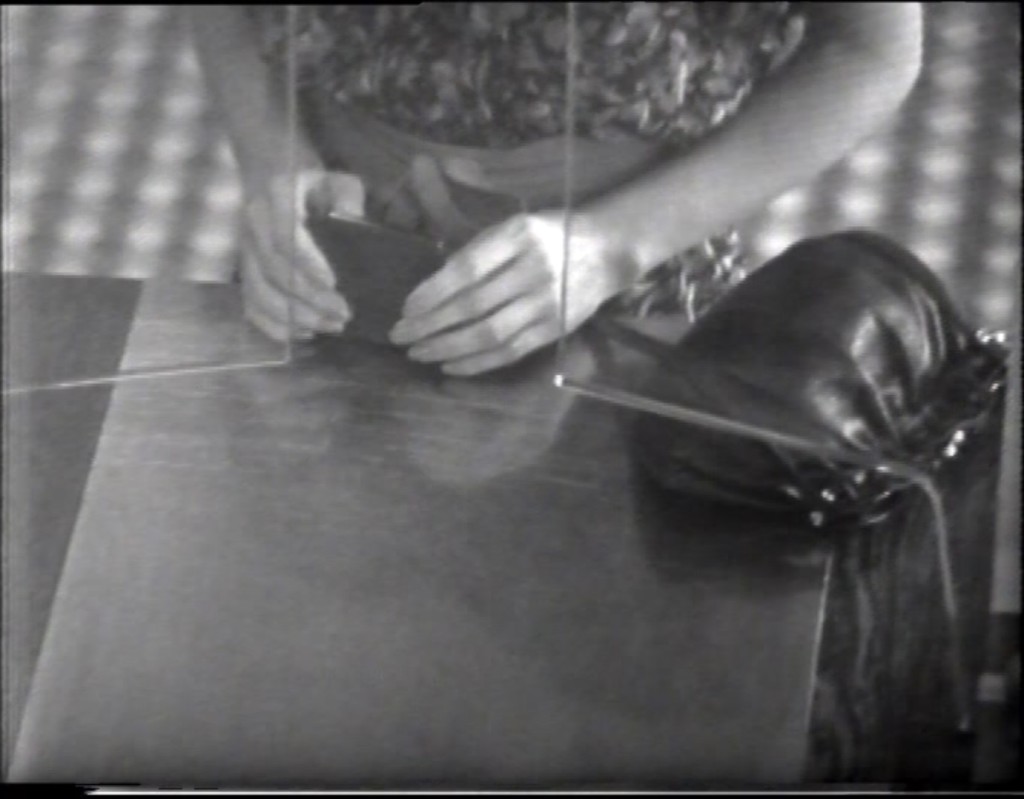“The film is about observing, about glances that see without being seen, a dubious art of light and visibility.”Der Riese [The Giant] (Michael Klier, 1983/1984)
Feb
15
freebie: a movie from 1984

A woman, we only see her hands, waits at a counter while clutching her purse. Her handbag is next to her. The camera focusses on the small space reserved to count out money. DP: n/a.
January 21 redux: a film from 1984 on the date Orwell died (1950).
– Michael Klier, via
According to Harun Farocki, Der Riese was the first narrative film completely compiled out of surveillance footage.
westgermany
– You have a good figure. You could use it to your advantage. Get in touch with me some time.
– I'd love to.Die bitteren Tränen der Petra von Kant [The Bitter Tears of Petra von Kant] (Rainer Werner Fassbinder, 1972)
Jan
31
freebie: high fashion

Fashion designer Petra von Kant (Margit Carstensen) – pouting in her emerald-green dress – is kneeled on a large, sheepskin carpet in front of a huge Baroque painting (Nicolas Poussin's Midas und Bacchus, ca. 1624). In front of her a small bottle of gin and a phone. DP: Michael Ballhaus.
A freebie for someone's birthday, with bonus points for high fashion. Petra von Kant is a fashion designer who, during a particularly icy birthday party, tells the world that her new lover is a woman. Then, one day, said lover returns home to her husband.
With its exuberant costumes and set design, a Greek chorus of mannequins, and Sirk-ish larger- than-life melodrama, Fassbinder's Die bitteren Tränen der Petra von Kant delves deep into the absurdities of love and fancy.
Die große Ekstase des Bildschnitzers Steiner [The Great Ecstasy of Woodcarver Steiner] (Werner Herzog, 1974)
Jan
25
Chamonix 1924 Winter Olympics

Live footage of Steiner preparing for his flight. DP: Jörg Schmidt-Reitwein.
Winter sports in celebration of the Chamonix 1924 Winter Olympics.
– Walter Steiner
In a film that is as much about Herzog as it is about Steiner, we follow the soft-spoken woodcarver in preparation of his definitive ski flight in Planica, Yugoslavia.
“I therefore concluded and decided unhesitatingly, that there are three stars in the heavens moving about Jupiter, as Venus and Mercury round the Sun; which at length was established as clear as daylight by numerous subsequent observations. These observations also established that there are not only three, but four, erratic sidereal bodies performing their revolutions round Jupiter… the revolutions are so swift that an observer may generally get differences of position every hour.”Operation Ganymed [Helden, verloren im Staub der Sterne] (Rainer Erler, 1977)
Jan
7
moons

Jupiter rising. DP: Wolfgang Grasshoff.
Moons for Galileo Galilei's observation of Jupiter's four largest moons in 1610: Ganymede and Callisto on January 7, and Europa and Io on January 8.
– Galileo Galilei, Sidereus Nuncius (”Starry Messenger”), 1610
A spacecraft named Ganymede II returns back to Earth after its expedition to Jupiter's moons followed by 1500 days stuck in space. The Earth they find, is deserted.
“When we behave nobody cares. But when we are bad nobody forgets.”Auch Zwerge haben klein angefangen [Even Dwarfs Started Small] (Werner Herzog, 1970)
Dec
30
National Short Person Day

Some of the main cast members, with three women in focus. They're outdoors and several animals, including a kneeling dromedary, can be spotted in the background. DP: Thomas Mauch.
A short main character for National Short Person Day (USA).
– Hombré
La horse [Horse] (Pierre Granier-Deferre, 1970)
Aug
23
baguette

Auguste Maroilleur (Jean Gabin) at the head of a long table, covered in Good Things (wine, butter, coffee, and fresh milk). He cuts a baguette with his pocketknife. DP: Walter Wottitz.
“I think it's really rotten of them to lock you up like this for making love to a boy.”Die Konsequenz [The Consequence] (Wolfgang Petersen, 1977)
Jun
17
prison grub

Thomas (Ernst Hannawald), the warden's son, and convicted homosexual Martin (Jürgen Prochnow) sharing a mug, a meal, a cell. DP: Jörg-Michael Baldenius.
– Thomas Manzoni
“Trouble is, she likes everything. She's always happy. She desires nothing, envies no one, is curious about nothing. You can't surprise her. She doesn't notice the humiliations, though they happen to her every day. It all rolls off her back like some waterproof material. Zero ambition. No moral code. Not even a whore's love of money.”Io la conoscevo bene [I Knew Her Well] (Antonio Pietrangeli, 1965)
Apr
2
cocktails
.png)
A lone Roberto (Enrico Maria Salerno) at a lively cocktail party in Rome's hypermodern EUR district. DP: Armando Nannuzzi.
– the writer
“I look into the distance to the end of the world. Before the day is over, the end will come. First, time will tumble, and then the earth. The clouds will begin to race… the earth boils over; this is the sign. This is the beginning of the end. The world's edge begins to crumble… everything starts to collapse… tumbles, fall, crumbles and collapses. I look into the cataract. I feel an undertow, it draws me, it sucks me down. I began to fal, a vertigo seizes upon me.”Herz aus Glas [Heart of Glass] (Werner Herzog, 1976)
Mar
13
tea

A young maid (Sonja Skiba) holding a heavy tray with cups, plates, and various tea-related pottery. There's a somnambulist quality to her bearing. DP: Jörg Schmidt-Reitwein.
– Hias
Mord und Totschlag [Degree of Murder] (Volker Schlöndorff, 1967)
Mar
4
juice

A pensive Marie (Anita Pallenberg) drinking something red from a bottle with a green straw. DP: Franz Rath..